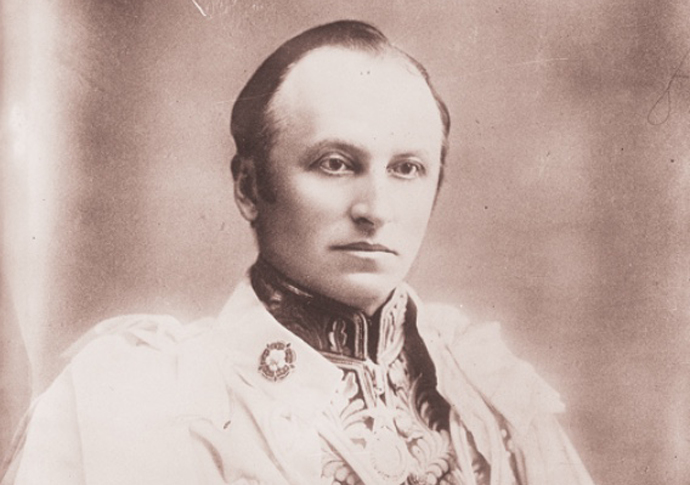Pomp it up: How ‘Britannia’s butler’ epitomised English aristocratic grandeur at the height of the Empire
In the latest in his series on eminent Victorians, Neil Titley turns his attention to Viscount George Curzon
Friday, 1st August 2025 — By Neil Titley

Viscount George Curzon
IN February 2025, the former Tory politician William Hague became Chancellor of Oxford University in a splendid, apparently medieval ceremony. The ritual, in fact, dates back only to 1907, and was created solely to appease the then Chancellor, George Curzon (1859-1925).
On his installation, Viscount Curzon found to his chagrin that the inaugural ceremony consisted simply of a few dons turning up at his house. He unearthed a 17th-century document that permitted a procession through Oxford and various attendant pageants. With the additional invention of an oath and speeches in Latin, Curzon was installed in the manner to which he had become accustomed. This essentially bogus event continues to this day.
George Curzon epitomised English aristocratic grandeur at the height of the Empire and his contemporaries were well aware of it.
Max Beerbohm called him “Britannia’s butler”. One sardonic verse haunted him throughout his life: “My name is George Nathaniel Curzon, I am a most superior person, My cheek is pink, my hair is sleek, I dine at Blenheim once a week.”
Born into power and prestige, he rose effortlessly to high office. Occasionally a dissident voice was raised against him. When Curzon was given a dinner by his admirers to congratulate him on his first government appointment, he gave a flowery speech during which he told the company that his success was due entirely to his personal decision only to associate with his intellectual superiors.
As these “superiors” were duly preening themselves on the compliment, a slightly drunk Lord Houghton sat up and growled: “Good God! That wouldn’t be difficult!”
In 1899, Curzon achieved one career pinnacle when he was appointed Viceroy of India; it was also where his reputation for ludicrous pomp became established. It was said that “he moved as if accompanied by elephants”. Rumours circulated that when Curzon retired to bed, two aide-de-camps had orders to precede him carrying silver candlesticks and walking backwards. When his wife Mary awoke in the morning, allegedly she had to curtsey to him.
However, as Viceroy, Curzon was noted for his honesty (unusually for viceroys, he returned from India poorer than he arrived) and his fairness: “I have never wavered in a strict and inflexible justice between the two races. It is the sole justification and the only stable foundation for our rule.”
In 1919, he achieved another ambition when he took control at the Foreign Office. His imperious manner still raised hackles. On one occasion several fellow ministers were waiting for Curzon’s arrival when a servant arrived carrying his footstool. Lord Derby rose and bowed to the stool, commenting: “Lord Curzon has not yet arrived, but we see premonitory symptoms.”
When King Amanullah of Afghanistan made a state visit to Britain, Curzon tried to interest him in English ways. This was to prove unfortunate as on his return home the King attempted to pass a law requiring all Afghan men to wear bowler hats. Rejecting this sartorial diktat, the Afghans promptly deposed him.
Occasionally a beam of wit shone through Curzon’s formal exterior. When he received one Foreign Office document he noticed a misprint: “Even the monks of Mount Athos are violating their cows.” Curzon quipped: “Better send them a Papal Bull.”
His love of ritualistic pomp sometimes created beneficial results. At the end of the First World War, he arranged for the installation of the Tomb of the Unknown Soldier in Westminster Abbey, and the Cenotaph in Whitehall. He also created the Remembrance Day service including the two minutes’ silence and the Last Post. For a nation stunned by grief the event proved so popular that the public insisted on its annual repetition.
On political matters, sometimes Curzon could be astute. He foresaw the problems associated with the “Balfour Treaty” policy over Palestine and predicted that unrestricted Jewish immigration would lead to decades of Arab-Jewish confrontation.
He was wary also of the rise of fascism. When one of his daughters married the British fascist leader Sir Oswald Mosley, Curzon described him as “my sinister son-in-law”.
After he called Mussolini “a thoroughly unscrupulous and dangerous demagogue”, the Rothermere Press was so angered by Curzon’s lack of respect for the Italian dictator that it unleashed a newspaper attack on him.
His refusal to follow the right-wing mainstream, combined with doubts over his capacity to delegate and his personal unpopularity, meant that when the opportunity to become Tory prime minister arose, Curzon was passed over. In the end he was the grandest of grandees but a rather honourable failure.
Perhaps the story that most summed up Curzon concerned an occasion when his friends teased him about being out of touch with ordinary life, saying that he had probably never even been on a London bus. He admitted that this was true and decided to board the first one he came across.
When the conductor asked him: “Where to, Guv’ner?” Curzon replied: “137A, Eaton Square, if you please”.
• Adapted from Neil Titley’s book The Oscar Wilde World of Gossip. www.wildetheatre.co.uk – available at Daunts, South End Green.